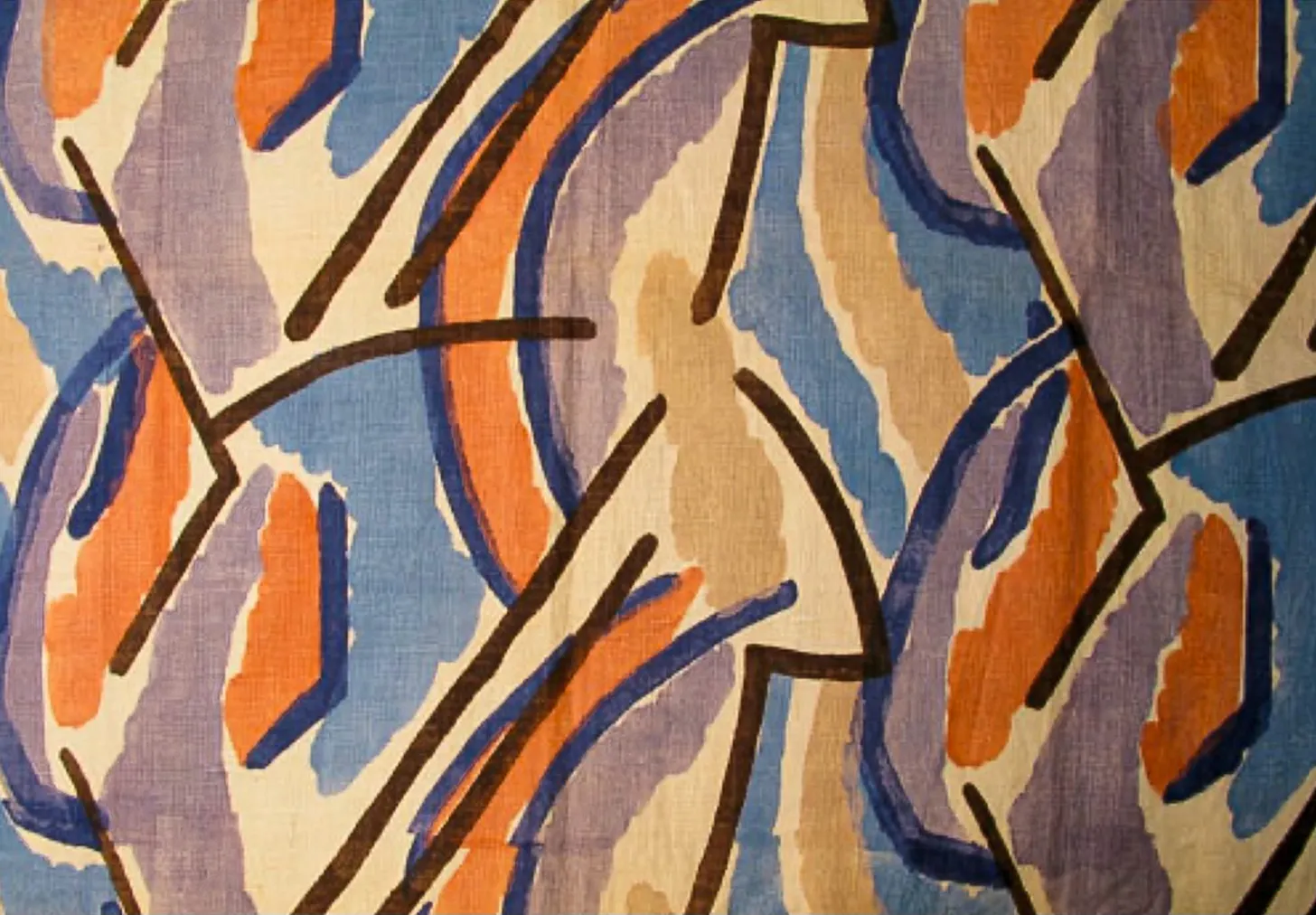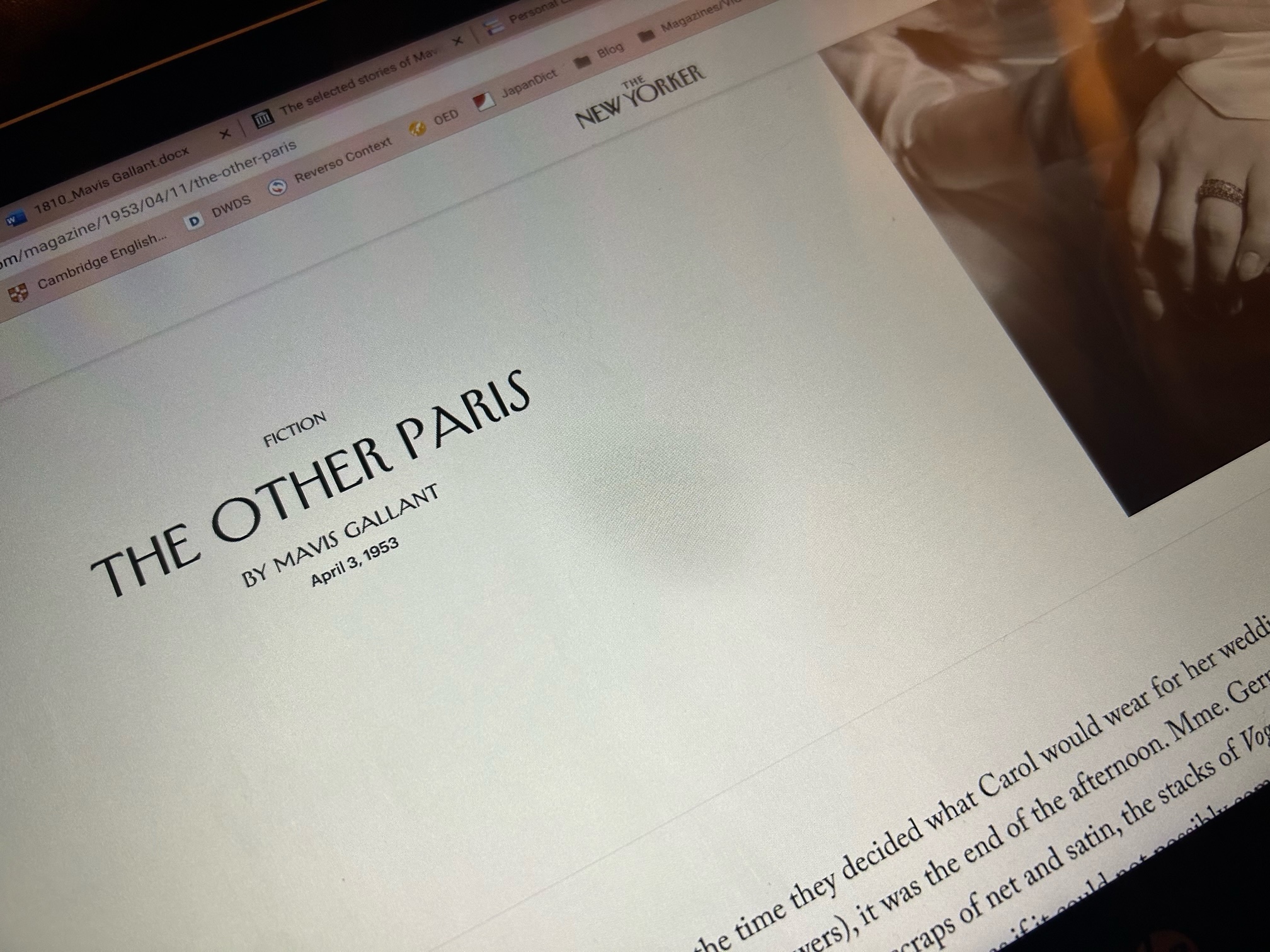I discovered Mavis Gallant while browsing through The New Yorker. The first text I read from her was ‘The Other Paris’, from 1953, one of her first published short stories. It hit me like a high-speed train in the middle of a stormy night. My mind was all over the place and it took a while until I gathered my bearings. She is unforgiving towards the reader and doesn’t make it easy for them. Nothing is given for free. If you don’t have time for reading, read a novel. If you have time, read a Mavis Gallant short story.
some biographical details
Mavis Gallant was born in Montreal in 1922 and died in Paris in 2014, the author of fifteen short-story collections, two novels and a play. The New Yorker published more than 100 of her short stories, starting with 1951, when Gallant, still living in Montreal, submitted three texts she had been working on.
“There is no such thing as a Canadian childhood. One’s beginnings are regional”, Gallant writes in the preface to her Selected Short Stories, a volume published in 1996. She grew up in Quebec in an English-speaking, Protestant family and at the age of four was sent to a French convent school. She learned French formally, but written English she learned from story books she had brought with her. “English was irremovably entrenched as the language of imagination”.
In a time when journalism was considered to be a job for men, Gallant worked as a journalist in Montreal. “I received half the salary paid to men and I had to hear, frequently, and not only from men that I ‘had a good job, for a girl’”. During that time, she learned the craft of writing and tried out her hand at writing fiction. She sent three of her short stories to The New Yorker and one of them was published. In 1951, the then 28-year-old Mavis decided to move to Paris to be a writer. That was a bold move, for she had no relatives and no acquaintances in the French capital. She moved to Paris just to write. “That I might not survive at all, that I might have to be rescued from deep water and ignominiously shipped home, never entered my head. I believed that if I was to call myself a writer, I should live on writing.”
The first two years living in the French capital didn’t bring Gallant the success she was dreaming of. She moved around Europe a lot and was in Spain when, lacking any financial means, discovered her stories had been published in The New Yorker without her knowledge. After contacting the magazine, it turned out her literary agent hadn’t been informing Gallant about her stories being published. The year 1953 marked the beginning of her writing career and of her life as an independent writer, supporting herself only by the ink in her pen.
mavis gallant’s philosophy of writing
During 1983-1984 Gallant was writer in residence in Toronto, where she taught people how to write. But, for her, that’s a contradiction. In her own words, “you can’t teach writing. They should know their language and read. Read, read, read”. The idea of writing by reading shines through in different forms in the interview she gave for Granta in 2009. But the author doesn’t give much insight into her process of writing. Imagining her being interviewed, offering responses which sometimes sound like life lessons, I can emotionally understand what she means when she says, “I have lived in writing, like a spoonful of water in a river”. For her, writing is not something she does, it’s something she is.
Gallant practiced (and eventually learned) how to write while in Melbourne, working for an English-language periodical. Even though bilingual, English has been her preferred language. She seems to have only one rule: “I could not move on to the second sentence until the first sounded true”. In addition to that, she erased, rewrote, corrected, re-read. Speed was not her measure, and she wondered to herself how she didn’t find herself jobless because of her “outrageous slowness”. But her command of the English language made up for that, Gallant believes. That, and her curiosity for people and places.
You have to be curious about people if you are to write them and about them like Gallant does. Character is the absolute peak of her writing. Other writers might hear the characters talking, she assumes, but, for her, characters come already formed, they are complex people, bad, good, both. “I know what is being said”, Gallant bluntly puts it. In the short stories I am looking at below, a character is always in the middle, either telling the story, looking at the world, or having the world look at them. There is a deep sense of intimacy which is built between character and reader, and at the same time, there is a distance which cannot be surmounted. Like it happens with the closest people in our life, I think.
Details of Gallant’s biography, her duality of language, the backdrop of World War Two and volatility of place shine through in her short stories. She writes about people who are missing a sense of belonging, are dis-settled, can’t find their home. Remnants and memories of the Second World War are always in the air. People either grow from the war or remember the times before the war, but the clear difference between the present and the past is always made somehow.
The Other Paris (1953)
This was the first short story I ever read by Mavis Gallant. The first reading experience left me baffled, I didn’t get why Odile would mock Carol for her romantic love story with Mr. Mitchell. And the story lacks absolutely any luster in itself. Carol, a young naive American woman, moves to Paris, where after only three weeks, is engaged to marry Mr. Mitchell, the head of her department. She has a very stereotypical, romanticized image of Paris, dreams of romantic love, and has no friends except for the shabby Odile, her work colleague. When Carol takes a peek into Odile’s love life, what she finds there impresses her to the core and pushes her further into a life of self-denial.
The story puts in opposition reality and illusion, lie and truth, self-deception and the art of living. Carol has pre-formed images of life, love and Paris, which don’t fit together with what she finds in Mr. Mitchell and in the city. She knows there is something off in her relationship, yet rather than admit she was wrong, she prefers creating artificial images which in time she can only hope will form into something like memories. The short moments of truth she glimpses through, especially when witnessing the relationship between Odile and Felix, she rejects as obstacles in a life which she hopes is still waiting for her out there, somewhere.
It was simply that she believed they knew a secret, and if she spoke to the right person, or opened the right door, or turned down an unexpected street, the city would reveal itself and she would fall in love.
Voices Lost in Snow (1976)
This story took me three days to get through and understand, at some level. We are lucky to have it read out loud by Margaret Atwood, who also offers commentary as a sort of introduction. This is how I learned of the autobiographical elements Gallant weaves in the story and living in Canada as a child.
On the first listen/read, the story is a haze. I really think this is one of Gallant’s most challenging stories. The first-person narrator is a woman who slips into her young-girl-self and tells the story as if from her young-self point of view. But there are slips, turns and interruptions in the narrative which tells of a visit which the narrator takes together with her dad to one of her godparents. On a deeper look, we realize it’s much, much more than that. Religion and superstition, love and separation, time and memory, all play a role in this story which, on the surface, is little more than a sketch on the background of growing up.
And what makes it more difficult are sentences like this, which are picturesque, mysterious, plastic and downright impossible.
Dark riddles filled the corners of life because no enlightenment was thought required.
Lena (1983)
This is one of Mavis Gallant’s “easier” texts, if this word can be applied at all. Similar to ‘Voices Lost in Snow’, it has a first-person narrator who, years later, thinks back on an event which is marking his present life. But this is where the similarities stop. The narrator is Edouard, an older man who still keeps in touch with his first wife, Magdalena, who is cared for in a home for the elderly. We get a glimpse into the life of Magdalena through the memories of Edouard, who, even late in life, still is fascinated by “his poor, mad, true and only wife”.
She can choose among three or four different languages, her choice depending on where her dreams may have taken her during the night.
She talks the way she talked in the old days, in her apartment with the big windows and sweeping view across the Seine.
She used to travel by train to Budapest and Prague wearing white linen. Now no one goes to those places, and the slim linen suits are crumpled in the trunks.
Detail is everything in this short story. Each word and each adjective serve as a building block to construct a vivid and colourful narrative. You feel an emotional connection to Magdalena, the old lady in the caring home who swept across Europe in her travels and (quite possibly) charmed countless men in her white linen and with her three or four languages. Terrific. And then the sentence, like a hammer on the brain: “They called Magdalena, Lena”. This brings you back to the sharp and all too real present. All that is gone. Today Magdalena is nothing more than Lena. It makes my skin crawl.
final thoughts
I only chose three of Mavis Gallant’s short stories, but I believe them to be most representative. They explore themes of memory, childhood and a sense of longing for home, which are recurrent in her writing. I also loved ‘The Ice Wagon Going Down the Street’ (1963), ‘When We Were Nearly Young’ (1960), and ‘From the Fifteenth District’ (1978). Treat yourself to any of these, or any other one, and know this – Mavis Gallant’s short stories are not for binging, but for savoring. Gift one of them your time. Read it, suffer for not getting what’s going on, read it the next day, suffer less, read it on the third day, in a week. You’ll be in awe, and you will be the one gifted in the end.





your thoughts?